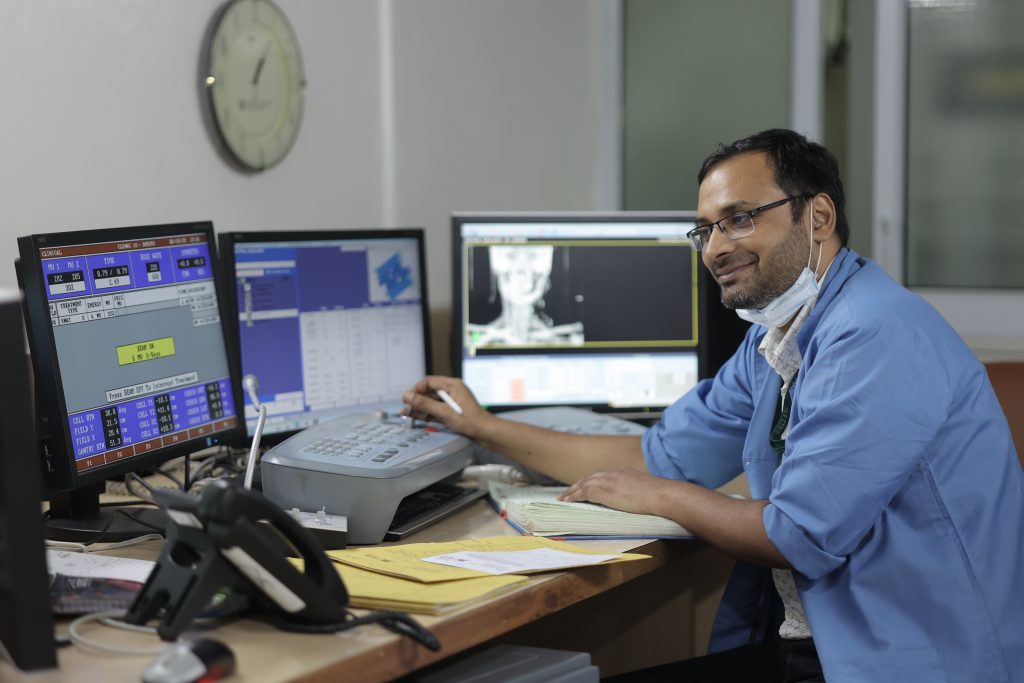RADIATION ONCOLOGY SERVICES
So You have been advised for Radiotherapy for your cancer Treatment ?
Lets Begin –
How Well Do You Know Your Hospital?
Rajiv Gandhi Cancer Institute & Research Centre, New Delhi, with its tradition of quality and excellence offers comprehensive Cancer treatment with the most advanced techniques of radiotherapy for all Cancer patients. The department is equipped with Linear Accelerators, Simulators, Dedicated Treatment Planning Computers and Mould Rooms to fabricate immobilization devices and customized lead shields in house. The department has been intricately networked to CT scans and MRIs with DICOM image transfer capability that makes it one of the best Radiation Oncology Departments and radiation therapist services in any Cancer Hospital in India.

What is Radiation Oncology?
Radiation oncology is a clinical and scientific discipline devoted to management of patients with cancer and other disease by ionizing radiation, alone or combined with other modalities.
What is Radiation Therapy?
Radiation therapy (also called as radiotherapy) uses targeted energy, including X rays, or gamma rays or electrons and radioactive substances, to destroy cancer cells, shrink tumors and thus reduce certain cancer-related symptoms.
Objective of Radiotherapy?
The aim of radiotherapy is to deliver a tumoricidal dose of radiation to a well defined target volume while sparing the surrounding normal tissue thereby achieving an optimum therapeutic ratio with the minimum level of morbidity.
What are the Goals of Radiation Therapy?
Radiation therapy is an effective treatment for various types of cancers in almost any part of the body. Its two main goals are :
- To cure cancer
- To relieve symptoms
For many patients, radiation is the only treatment needed. However, radiation treatment may also be given in combination with chemotherapy and / or surgery to shrink a tumour and during or after surgery to kill any cancer cells that may still be present.
Doctors sometimes use radiation along with anticancer drugs to destroy the cancer instead of performing surgery. Radiation can be used as a palliative therapy, meaning that its primary intent is not to cure the cancer, but to relieve pressure, bleeding or pain by shrinking the tumours. Palliation may not add years to the patient’s life but adds quality to the time available to him/her.

How does Radiation Work?
Radiation with x-rays or electrons producers free radicals within the nucleus of the cell, which damage the deoxyribonucleic acid (DNA) of the cell. The DNA which has been exposed to radiation damage, is not
Divides. Therefore, the regression of a cancer after radiation may be visible only after a gap (lag time) rather than within first few days of radiation. A few cancers divide very rapidly e.g. lymphomas; here the radiation damage is perceptible at a quicker pace able to reproduce when it undergoes the cell cycle division. This damage is expressed only when the cell.
Which Tumors can Radiation Cure ?
Radiocurability refers to the eradication of tumour at the primary or regional site and radiosensitivity expresses the response (degree and speed of regression) of the tumour to irradiation.
Radiosensitive tumours Embryonic tumours and reticuloses e.g.. Dysgerminoma, Seminoma, Neuroblastoma, Retinoblastoma, lymphomas are highly radiosensitive.
Intermediately sensitive tumours – squamous cell carcinoma and adenocarcinomas are intermediately sensitive to radiation. e.g. Skin cancer (basal and squamous cell), head and neck cancer, breast cancer, cancer of the uterine cervix, cancer prostate, Ewing’s sarcoma, rhabdomyosarcoma.
Radio resistant tumours – soft tissue sarcoma, bone tumours and melanomas e.g. Osteogenic sarcomas, Glioblastomas (brain tumours), Melanoma.
Radiation used with Surgery
Radiotherapy is used postoperatively to sterilize the loco-regional area for microscopic disease, residual disease, if lymphovascular invasion is present, in high grade and aneuploid tumours, so that the chances of tumour recurrence (coming back) are minimized. E.g. Breast cancer, soft tissue sarcomas, rectal cancer, esophageal cancer, stomach cancer, brain tumours, kidney tumours etc.
Radiation is Combined with Chemotherapy
Combining radiation with chemotherapy has led to the preservation of organs bearing cancers, especially for cancers of larynx (voice box) and anal canal. The patients can preserve their natural voice and natural passages and get rid of the tumour at the same time.
Concomitant chemotherapy is used to increase the sensitivity of tumour to the radiation and lead to an increase in the probability of tumour control and curability.
In other cancers e.g. carcinoma breast and lymphomas radiation after chemotherapy consolidates the tumour control and reduces the chances of recurrence.
Radiation Therapy Facilities
The external beam radiation therapy is the form of radiation treatment, delivering several beams of high-energy photons
Radiation Therapy Process
The process of radiation therapy is customized for each patient, depending on the form of radiation therapy planned for the patient by their physicians
Care of Patients undergoing Radiation
There is a scale of radiosensitivity of cells ranging from highly sensitive to relatively insensitive. The for…